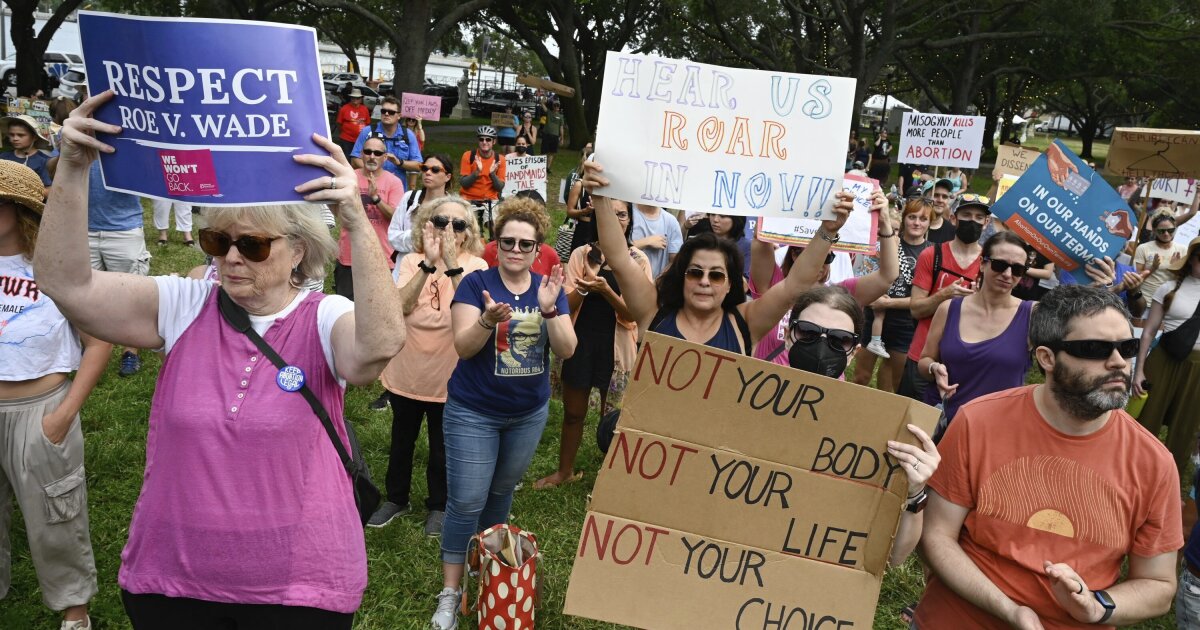For Wendy Vargas, the recent elimination of a constitutional right to abortion — and the banning of the procedure in many Republican-controlled states — is an affront to her values as both a woman and an American.
“This is supposed to be a first-world country,” said the 32-year-old Colombian immigrant and independent voter who leans Republican. “We’re supposed to have more freedoms here.”
But will the assault on abortion rights determine the way Vargas votes?
Both major parties are asking that question in the run-up to the November midterm election. With a majority of voters nationwide favoring abortion rights, Democrats are making it a central issue in swing states, while Republicans hope to avoid a backlash that could dampen the “red wave” that polls and experts have been predicting.
That tension is especially acute in Florida, where Republicans dominate the political landscape but 56% of the people believe abortion should be legal in all or most cases. Federal data show that only New York and Illinois have higher abortion rates.
Vargas, who helped propel Republican Ron DeSantis to the governorship with her vote in 2018, remains undecided on whether she will support his reelection bid. Countering her opposition to the Republican position on abortion are economic problems that she pins on Democrats.
“Like inflation,” said Vargas, who manages a cellphone store. “How crazy prices are with everything. Everything is going up.”
DeSantis and Florida’s Republican-controlled Legislature have been more cautious than their counterparts in Louisiana, Mississippi, South Dakota and other red states where a majority of voters oppose abortion.
While most of those states had laws in place to ban abortion in almost all cases after the U.S. Supreme Court struck down Roe vs. Wade last month, Florida had only tightened its restrictions to ban abortion after 15 weeks of pregnancy — down from 24 — with no exceptions for rape or incest.
Hours after Roe fell, DeSantis vowed to “expand pro-life protections.” But he has not focused on abortion, a decision that political analysts say is meant to avoid alienating swing voters, who make up about a quarter of the state’s electorate.
His campaign is likely to highlight a faltering national economy, high gas prices and parental rights and teaching of race, sexual orientation and gender identity in schools — issues that have fueled support for Republicans nationally. Florida voter registration records show that the number of Democratic voters in the state has plummeted by nearly 100,000 in the first five months of this year.
“Abortion is not a top-tier issue,” said Steve Vancore, a pollster who owns Clearview Research in Tallahassee and is a Democrat. “Ron DeSantis is going to win in a landslide.”
Historically, single-issue voters on abortion have tended to be those who oppose it. Democrats are hoping to change that now that abortion is no longer a constitutionally protected right.
“I do believe that we will mobilize and work to try to bring back pro-choice Democrats in the Senate to stop these policies,” said Florida state Sen. Lauren Book, the minority leader. “Because of Roe being overturned, we know it’s left to the states. And so we take care of business here.”
Rep. Anna V. Eskamani, a Democrat in the Orlando area who used to work for Planned Parenthood, organized rallies downtown to protest the reversal of Roe and launched a virtual phone bank, calling registered independent and Democratic women to encourage them to mobilize and vote.
“If you care about not just abortion rights, but all of our collective freedoms, you have to get involved now and help us build political power long term,” she said.
Though DeSantis has not pushed for an outright ban on abortion, Democrats are warning that he plans to do just that to consolidate the national Republican base as he eyes the party’s nomination for the 2024 presidential race.
“We’re raising alarm bells,” Eskamani said. “If Gov. DeSantis is reelected, abortion will be banned full stop. No question about it.”
Such messaging is largely aimed at young voters, who don’t typically vote in midterms but have the most at stake when it comes to abortion.
Thousands of protesters, most of them young, took to the streets of Orlando last week, holding up signs that said, “Listen to Women” and “God gives me the freedom to choose. Why can’t you?”
“If you don’t vote, you are silencing yourself,” said one of the protesters, Melanie Ramos, a 22-year-old call-center worker for Disney who grew up in a traditional Christian family in Miami being taught that abortion is a sin.
“I definitely feel like Florida is becoming one of those traditional Southern states, where they take everything away from women,” she said. “I’m scared what they will end up doing.”
In interviews, some women who have paid little attention to politics said they were unsettled by the prospect of losing long-held abortion rights.
“This came out of nowhere,” said Vaneza Lebron, a 30-year-old legal assistant from the city of Kissimmee, just south of Orlando. “It’s an attack on women and a step back for women. They’re policing what we can do with our own bodies.”
Lebron, who had an abortion at 25 because she felt her then-boyfriend was not ready to help raise a child, said she votes in presidential elections but has usually skipped midterms.
Now she feels motivated to vote against DeSantis and other Republicans in November. But she worried that some of her closest friends and even her mother seem unmoved.
“It’s just crazy that people don’t take this seriously,” she said. “Will there be pushback?”
Lebron’s parents are from Puerto Rico and Mexico — and part of a growing Latino presence that also includes recent waves of immigrants from Colombia, Venezuela and the Dominican Republic.
Latino voters, who account for 18% of the electorate statewide, have traditionally favored Democrats, but that support has been shrinking and enough voted Republican in 2020 to help Donald Trump win Florida. Republicans view them as natural allies on culture-war issues including abortion.
Maria Gonzalez, 33, a nurse from Venezuela, said her pastor at the Sts. Peter and Paul Catholic Church north of Orlando celebrated the Supreme Court ruling as God’s will.
“We vote based on our faith,” said the mother of two. “We tend to be very conservative. If you ask any non-Generation Z, they will all be for this governor and the ruling because of our faith.
“If you want to get an abortion, go to California,” she said.
In a nod to the pull that churches have with many Latino voters, DeSantis signed the 15-week abortion law in April at Nación de Fe, an evangelical congregation in Kissimmee.
But Latino abortion-rights activists are now trying to hone a new message to reach the younger generation.
“You’re not a slave to the patriarchy or machismo, you’re not a slave even to the church,” said Nancy Rosado, 66, a clinical social worker. “You have the free will to make your own decisions. That’s what God has given to you.”
Stephanie Loraine Piñeiro, 30, co-executive director of Florida Access Network, an Orlando-based abortion fund that offers women seeking abortions gas and child-care stipends, said she sees other opportunities for inroads.
“My grandmother, God bless her, doesn’t know how to talk about abortion politics, but she is very aware that somebody shouldn’t be forced to remain pregnant against their will,” Piñeiro said. “She’s not going to be out there protesting on the streets, but if someone she loves needs to have an abortion, she will be supportive.”
Piñeiro said when she was a teenager, her father drove her to get an abortion, but on the way home he lectured her that she needed to close her legs.
Still, she said the best hope for restoring abortion rights across the country would be passing a federal law while Democrats still control Congress, because she didn’t see much chance of defeating the Republicans in the next election.
“Right-wing fundamentalism and white supremacy is not going away, it doesn’t go away by voting,” she said, arguing the well-established point that abortion restrictions hurt minorities most. “I don’t want to be bleak, but I don’t hold my breath. In the United States, there’s so much to rage about.”
The political calculus has emboldened Florida’s antiabortion activists. Andrew Shirvell, executive director of Florida Voice for the Unborn, said that after speaking with a senior member of DeSantis’ office he felt confident the governor would call a special session to pass a near-total ban on abortion before the end of the year.
“I don’t think Democrats are going to have any say,” he said. “Florida is going to end up being one of the leading pro-life states in the country.”





















Discussion about this post